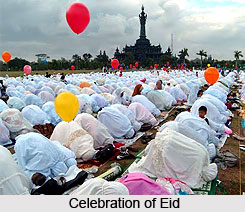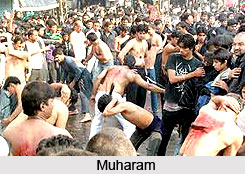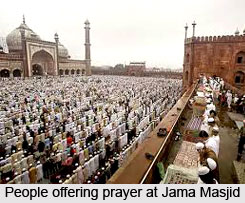 Indian Muslim Festivals mostly are religious. Muhammad, who is regarded as by his followers as the last Prophet, the Messenger of God, introduced Islam in the seventh century AD. All Muslims agree on the following five basic obligations for believers, which Sunnis term "Arkan" or the "Five Pillars of Islam" and Shia Muslims would consider being elements of the Roots of Religion and the Branches of Religion. The Pilgrimage to Mecca during the month of Dhu al-Hijjah, is compulsory once in a lifetime for every follower of Islam.
Indian Muslim Festivals mostly are religious. Muhammad, who is regarded as by his followers as the last Prophet, the Messenger of God, introduced Islam in the seventh century AD. All Muslims agree on the following five basic obligations for believers, which Sunnis term "Arkan" or the "Five Pillars of Islam" and Shia Muslims would consider being elements of the Roots of Religion and the Branches of Religion. The Pilgrimage to Mecca during the month of Dhu al-Hijjah, is compulsory once in a lifetime for every follower of Islam.
The Islamic calendar followed by the Muslims started on the Hijrah. The migration of the Prophet Muhammad from Mecca to Madina in 622 AD is called Hijrah. The beginning of Hijrah 1407 corresponds to the Gregorian year 1987(January). The months of Hijrah year are: Muharram, Safar, Rabbi-ul-Awwal, Rabi-us-Sani, Jamad-ul-Awwal, Jamad-us-Sani, Rajab, Shaban, Ramzan, Shawwal, Zil Qaid and Zil-Hajj (Dhu al-Hijjah.
Barah Wafat
Barah Wafat marks the birth and death anniversary of Prophet Muhammad. It is observed on twelfth day of Rabi-ul-Awwal, which is the third month of Muslim calendar. The name has been derived from the twelve day`s sickness of the Prophet which resulted into his death. As the birth and death anniversary of the Prophet coincides on this day, no grand celebrations are observed and Muslims are involved in spiritual activities. Narration of miraculous deeds of Prophet Muhammad, recitation of Quran, sacramental meals and fatihah prayer are the common activities performed during Barah Wafat. In some of the mosques `Sandal Rite` ceremony is carried out where stone engravings, having symbolic footprints of the Prophet, are worshipped.
 Eid-ul-Zuha
Eid-ul-Zuha
Id-ul-Zuha marks a significant day in Islam when Hazrat Abraham sacrificed his own son on a command of God. Also known as Bakr-id, it is celebrated in Zil hijja, twelth month of Muslim calendar, from tenth to twelfth day. The day coincides with completion of holy Quran as well as the pilgrimage journey Haj. Devotees, on this festival, offer prayers for prosperity and peace. The festival is accompanied by grand feasts arranged with special delicacies, exchange of gifts and animal sacrifices which is mainly made to provide food to the poor.
Eid al-Fitr
Eid al-Fitr is observed on the end of the ninth month of Muslim calendar, Ramzan. The name of the festival refers to the `festival of breaking the fast`. During this month, fast is kept by the Muslims every day and the completion of this period is marked by the appearance of new moon. The festival is accompanied by elaborate celebrations which include decoration of houses, special prayers, preparing food delicacies, exchange of gifts and visit to friend and relatives.
 Muharram
Muharram
Muharram is observed in the first month of Muslim calendar, on tenth day. It marks the martyrdom of the grandson of Prophet, Hussain in the battle at Karbala in 680 CE. The most prominent feature of the festival includes processions, colourful crowds and masked dancers. Muharram is in fact a sad occasion where people in the processions chant "Ya Hussein" with loud wails. The festival is however celebrated in a different manner by the Shias. They wear black clothes as a symbol of mourning. Processions are carried out where grief is showed by hurting own selves. This is considered as the depiction of the suffering of the martyrs.
Sair-E-Gul Faroshan
Sair-E-Gul Faroshan was initiated by Muhammad Shah Rangila, a Mughal emperor, 150 year ago. It is a regional festival that celebrates communal harmony in Delhi. The festival is celebrated with great fervour in Mehrauli. Pilgrims from distant places visit the place and cultural programs are held at Jahaz Mahal, built by Lodhis. Kathak performances, fire dancing, long processions are the most attractive feature of this festival which creates an ambience of gaiety and fun.



















